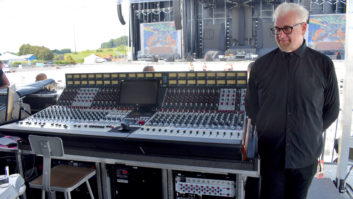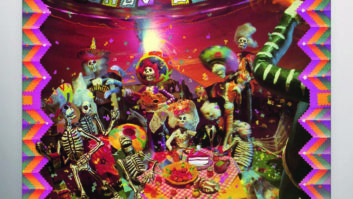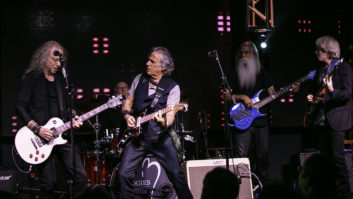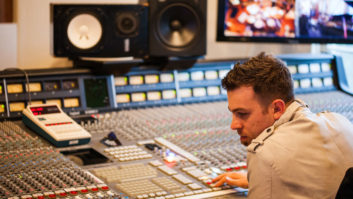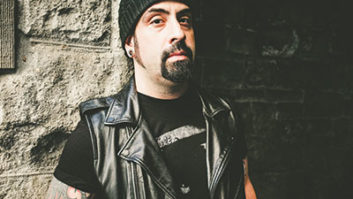The debut single from Kenny Chesney’s 13th studio album, his seasons-of-life/football tribute single “The Boys of Fall,” spent better than three weeks (peaking at number one) on Billboard’s country singles list. The album itself, Hemingway’s Whiskey, debuted atop the Billboard 200 chart. The album is Chesney’s sixth to start at the top of that chart, and his 10th to reach the pinnacle its country album chart.
Chesney’s been off the road in 2010, returning to the studio to retool the album before its release and traveling around the country filming a just-released companion documentary for “The Boys of Fall.”
The artist reminisced with Pro Sound News on his decades in the studio, and how Hemingway’s Whiskey evolved.
On Working with the Late Barry Beckett on Early Albums:
I learned a lot from him…. I’d be in the studio, I’d be in there singing like I was singing in the bars and the clubs, like I was trying to sing over everybody to get somebody to listen to me. Barry goes, “Kenny, you’re doing good, I just want you to get in there and relax and put a smile on.” I’ll be in the vocal booth today, I’ll do a vocal, I’ll go in and listen to it and I’ll sit there and think “You know what? I need to put a smile on it.” That’s Barry’s influence.
On Mixing Advice from Beckett:
In the studio, I’d be obsessive with us in there mixing a record, and he was one of the first guys to tell me to leave the studio. He goes (I swear), “Kenny you can outthink this stuff. If you sit in here and turn knobs all day, you’re going to lose the feel.” He called it mixing the hit out of it. “You’ll mix the hit right out of it.” And he’s right, you know.
On Working with Producer Buddy Cannon:
Buddy and I have really developed a strong working relationship in the studio. I respect Buddy. Buddy’s song sense has had a big influence on me. He’s been in town a long time, and he’s soaked up a lot of wisdom from a lot of songwriters and a lot of life and a lot of living in those songs. I couldn’t imagine doing this without him, because his song sense is incredible and his ear is incredible in the studio. I feel like I get in the studio with these musicians and I can hear in my head how I want it to be, how I want it to sound, but I don’t necessarily know how to translate that, and Buddy knows…. Buddy and [mixing engineer] Justin Niebank predict exactly how I’m going to feel about certain things. There’s been a learning curve with all of us; it’s been a great ride we’ve all been on creatively.
On Rebooting the Recording Process with Hemingway’s Whiskey:
We had the opportunity to really talk about music and to really work with the musicians. Buddy and I had a chance to talk a lot about what the songs meant, about how we wanted them to sound production-wise and sonically. I had an album made last summer. I had in my head that I was going to take this year off the road, and I wanted this album to be done, too. I went in there with Buddy and Justin and we mixed a record—we mixed a whole album—but we didn’t have an album. We had three songs.
On the Elements That Set Hemingway’s Whiskey Apart from Previous Albums:
We took a few extra chances melodically with songs, and [as the saying goes] sometimes less is more. But I think with this record, I wanted the songs to stick out. I don’t know that I would have cut a song like “You and Tequila” and had Grace Potter sing it with me a couple of years ago. I might have, but I don’t know. I felt really comfortable in my skin doing that song and treating it like we treated it. I don’t know if it’s necessarily a twist of the knob that makes this record sound like it does, any different than the other ones. To me, as I hope to the people that are listening to it, it doesn’t sound like I made this record on a treadmill cycle.
I wanted to stay true to my fans and people who come to see us live, but I also wanted to push them, and I wanted to push my music and push me as a person, as an artist.
On the Engineer’s Contribution:
Dynamically, I think Justin might be the best. There’s a song on this record called “Seven Days (A Thousand Times)” that is one of the most dynamic songs I’ve ever recorded. There’s a lot of Justin’s influence on that record, in ways that made it what it was.
Tony [recording engineer Tony Castle] and I, we’re constantly working; he’s been a huge part of what’s happened to me in the last several years. Tony’s got all the hard drives, so to speak.
Tony and I grew up in the same part of the country; he’s from East Tennessee also. We just understand each other; we’re very comfortable in the studio. He’s very easy to work with, and he’s really smart and really good at what he does, and he’s quick…Tony is, to me, ahead of that curve; that’s why I love having him around.
On Contemporary Recording Techniques:
I don’t feel like we’re manipulating the art of it at all. I just feel like we’re making the best record we possibly can and with as much integrity as we can. If you’re doing it all on computer, there’s not a lot of integrity in that, but I believe the way we make records, Buddy and I have found our comfort zone where we’re comfortable in our skin. I think that [the recordings have] as much integrity in them—whether we fly a vocal or a fiddle lick or a guitar lick—that there’s still as much integrity there as there ever was.
I loved the process of making Hemingway’s Whiskey. And I love the end result.
